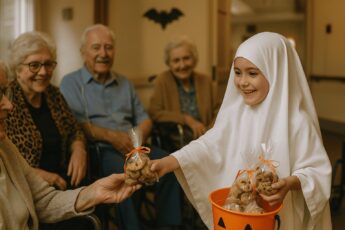In a world where wealth so often breeds arrogance and cruelty, the story of Naomi — a maid in the glittering Richards mansion — reminds us of the quiet strength of resilience and the unexpected power of kindness. Hers is a tale that cuts through the walls of class and privilege, revealing how humanity can surface even in the most hostile of circumstances.
A Palace with Cracks
On Bishop Admy Drive, nestled deep in the luxurious enclave of Banana Island, the Richards estate stands like a monument to excess — tall iron gates, manicured lawns, polished marble floors, and cars that gleam like jewels under the Lagos sun. To an outsider, it is the picture of perfection.
But inside those walls lies a different world.
The house is ruled by Madame Rose, a woman as admired for her beauty as she is feared for her cruelty. At just 33, she looks as though she were always on her way to a red-carpet premiere — her dresses flawless, her makeup precise, her presence commanding. Yet her charm is razor-edged. Servants whisper that she has already driven away nine maids in six months. Some left weeping, others vanished without a word, too terrified to resist her fury.
To live under Madame Rose’s roof is to walk on broken glass. The staff move like shadows, their heads lowered, their voices hushed. Even laughter dares not rise above a whisper.
Enter Naomi
Into this atmosphere of fear stepped Naomi.
Dark-skinned, quiet, and carrying nothing but a cheap nylon bag, she did not look like someone who would last long. But unlike the others, Naomi came not to impress or to flee — she came for survival. Behind her quiet eyes was a fire. She had a sick daughter, Deborah, lying in a hospital bed, and Naomi had promised herself: I will endure anything to keep her alive.
Her first task was the marble floor. As she bent to her work, her lips moved silently: “Three months. Just hold on for Debbie.”
But almost immediately, Madame Rose appeared. With a smirk, she tipped over Naomi’s water bucket.
“Clean it,” she ordered sharply, “and don’t keep me waiting.”
Naomi bowed her head and obeyed. She said nothing. But inside, her resolve only grew stronger.
The Silent Fire
Most maids had crumbled under Rose’s temper. But Naomi was different. She had already known harder days, harsher hands, colder homes.
So she endured.
Every dawn, before the rest of the house stirred, she scrubbed, dusted, polished. Madame Rose’s insults rolled off her back like rain. Even the slaps — delivered swiftly, almost casually — did not break her. Her silence was not weakness but strength, and soon the household began to notice.
What unsettled Madame Rose most was not Naomi’s obedience, but her unshakable calm. Fear, Rose’s favorite weapon, seemed powerless against her.
A Crack in the Armor
Then came the morning everything changed.
Naomi entered the grand sitting room to find Madame Rose not as the perfect, polished woman she always presented, but crumpled on the floor. Her makeup streaked, her hair undone, her eyes hollow.
“I am nothing,” Rose whispered, her voice trembling. “Nothing but a trophy on my husband’s arm.”
For a long moment, Naomi said nothing. Then she crouched down beside her employer, her voice low, steady:
“You are more than that, madam. But you must let yourself believe it.”
In that instant, Naomi stopped being just a maid. She became something Rose had never allowed herself before — a confidant.
Transformation
From that day, small changes began. Rose asked Naomi about Deborah. She granted her a day off to visit her daughter in the hospital. Soon, Naomi was no longer just cleaning floors — she was being listened to.
When Naomi returned from the hospital, where she had held Deborah’s frail hand and whispered promises of hope, she carried back something else: strength renewed. The mansion began to shift. The staff no longer tiptoed in terror. Laughter returned to the halls. Even Mr. Femi Richards, the aloof master of the house, noticed the difference.
“You’ve brought peace back into this home,” he told Naomi one evening. “For that, I am grateful.”
A New Beginning
The greatest surprise came weeks later. Rose invited Naomi to a women’s luncheon — an event that gathered some of the most powerful figures in Lagos. Naomi, nervous in her modest dress, sat quietly at Rose’s side.
“This is Naomi,” Rose announced, her voice ringing with unusual pride. “She is stronger than any woman I know.”
At that luncheon, Naomi’s life changed forever. A representative from the Children’s Heart Foundation, moved by her story, offered to sponsor Deborah’s treatment in full.
Naomi fell to her knees, tears streaming down her face. “God bless you,” she whispered. “God bless you.”
Conclusion
Naomi’s journey — from maid cowering in the shadows of a mansion, to a woman respected and cherished — is not just the story of survival. It is a story of transformation. She changed Madame Rose, she changed the Richards household, and most of all, she changed her daughter’s future.
The mansion on Bishop Admy Drive, once a house of fear, became filled with warmth, laughter, and second chances.
And at the heart of it all was Naomi — proof that sometimes the strongest people are not the loudest, nor the wealthiest, but those who endure, who hold on, and in holding on, change the world around them.







